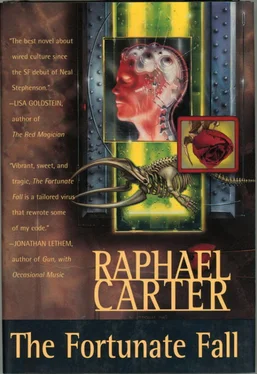Raphael Carter - The Fortunate Fall
Здесь есть возможность читать онлайн «Raphael Carter - The Fortunate Fall» весь текст электронной книги совершенно бесплатно (целиком полную версию без сокращений). В некоторых случаях можно слушать аудио, скачать через торрент в формате fb2 и присутствует краткое содержание. Город: New York, Год выпуска: 1996, ISBN: 1996, Издательство: Tor Books, Жанр: Киберпанк, на английском языке. Описание произведения, (предисловие) а так же отзывы посетителей доступны на портале библиотеки ЛибКат.
- Название:The Fortunate Fall
- Автор:
- Издательство:Tor Books
- Жанр:
- Год:1996
- Город:New York
- ISBN:0-312-86034-X
- Рейтинг книги:3 / 5. Голосов: 1
-
Избранное:Добавить в избранное
- Отзывы:
-
Ваша оценка:
- 60
- 1
- 2
- 3
- 4
- 5
The Fortunate Fall: краткое содержание, описание и аннотация
Предлагаем к чтению аннотацию, описание, краткое содержание или предисловие (зависит от того, что написал сам автор книги «The Fortunate Fall»). Если вы не нашли необходимую информацию о книге — напишите в комментариях, мы постараемся отыскать её.
“Gripping…. One of the most promising SF debuts in recent years”.
—“Publisher’s Weekly” starred review
The Fortunate Fall — читать онлайн бесплатно полную книгу (весь текст) целиком
Ниже представлен текст книги, разбитый по страницам. Система сохранения места последней прочитанной страницы, позволяет с удобством читать онлайн бесплатно книгу «The Fortunate Fall», без необходимости каждый раз заново искать на чём Вы остановились. Поставьте закладку, и сможете в любой момент перейти на страницу, на которой закончили чтение.
Интервал:
Закладка:
“We could get married.”
(The Unknown King)
(I don’t know what compulsion makes me go through the forms of suspense, as if the ending of the story were in some doubt. You already know that Africa is not where I wound up. The rumors say I’m in contact with them, that I’ve talked to His Majesty. It isn’t true. Perhaps the Known Kings do protect me in some way, but if so, they don’t tell me about it.
Once people have gotten an idea like that in their heads, though, it’s no use trying to get it out. So people ask me questions about Africa. And I make up answers, just as if I knew.
Most of the answers are simple. The question I’m asked most is who the Unknown King is, what her title is, whether I’ve met her—that’s the information everybody wants. And I tell them. I don’t know, of course, but it’s always seemed obvious to me. Think about the three Known Kings: His-Majesty-in-Chains, whose nerves are wound into his continent, so that he feels the hunger and the pain of all his people. Only-A-Man, who takes one person at a time and lives behind her eyes, though only for an hour. And Its-Ethereal-Highness, the calculator-king, whose justice is the justice of a balance beam, whose sympathy is parceled out by floating-point arithmetic. Male, hermaphrodite, and neuter; that means the Unknown King’s a woman. It stands to reason. And beyond that, can’t you see what the three represent? General sympathy, individual sympathy, law. Those are the three possible ways of reaching out to people. At least, I can’t think of any others.
And once you know that, well, isn’t it obvious what the Unknown King must be? And why she’s unknown?
She’s the one who turns away.)
Sixteen
VERY LIKE A WHALE
Tearing off the plastic babushka, I crashed down the stairs, fumbling to slot in the African moist-disk and camera chip. I couldn’t get them in with just one hand, so I gave up and let go of the railing to use both. Surely, after all that had happened, I would not break my neck on a mere staircase; the Weaver bullet rushing toward me would prevent all lesser dooms.
“Time?” I called out. My voice reverberated through the stairwell.
“You’ve got about three minutes,” Keishi said, her voice calm and echoless.
At the bottom of the third flight of stairs was the door to an elevator. Fortunately, the elevator car was already there waiting, but the ride down took at least a decade of subjective time. When the doors finally opened, I saw a corridor that went on for a hundred meters and then turned a blind corner. On both sides of the hall were moving sidewalks, like the ones they have in trainports.
“Stairs, elevator, now this,” I said, getting onto the conveyor. “If I have to slide down a pole, the deal’s off.”
As the sidewalk carried me along, I noticed that the one on the other side, for return trips, wasn’t moving. So much for a quick get away. Keishi was going to send my signal out along a winding path, which she said would take hours to unravel; but if the Post-cops did see through it, they would surely be here before I could get out.
“Forty-five seconds.”
“Count me down from ten,” I said, breaking into a run, “and whatever happens, make it look like I planned it.”
“Gotcha,” Keishi said. “The miscues are dramatic pauses, and the bumps are verite. So noted. Oh, and Maya?”
“Yes?”
“Neither down nor a feather!”
“To the devil!” I roared back. I’d need all the luck I could get.
The slidewalk took a left turn, then a right, and I passed several doors, all of them boarded up. Was the whole place abandoned? No, someone had kept the slidewalk in repair. Which did not, of course, mean that anyone was there at the moment. Please, God, don’t let this be a Capone’s Vault. I slotted the imagination enhancer, just in case.
“Ten,” Keishi said, with no end in sight. “Nine, eight,” and another curve came into view. “Seven, six, five”—I turned the corner. There was a door ahead: end of the line. I started a lunge—“four”—then changed my mind and stopped, letting the slidewalk carry me along. “Three, two,” and I was just stepping off, my momentum pitching me forward; I caught myself; “one—and you’re live.”
“This is Maya of hearth News One,” I said, briskly walking toward the door. “I’m in what used to be the laboratory of the Guardian collaborator, Aleksandr Derzhavin.” I paused to let the memories float up from the moistdisk: women with glass skulls revealing their brain grafts; rings of animals linked by cables; a Kazakhi infant with a second head, not human, hanging limply from his shoulder.
“I feel your horror, but it’s muted,” I said, stopping in front of the door. “After all, it was a long time ago. The Guardians are gone, and Derzhavin is dead, and it’s hard to get worked up about it. But this place is not abandoned. Someone lives here—someone for whom Derzhavin’s experiments are much more than a distant memory.” I put my hand on the doorknob. “This is Maya Andreyeva, coming to you from about a kilometer underneath—ah, underneath the ground.” No sense giving the Postcops free hints. “And I’m about to show you something amazing.”
I hope. I turned the doorknob—and had to suppress my relief when the door opened easily. I walked through into a room that, but for the lack of a sparking Jacob’s-ladder, might have been the set of some remake of Frankenstein. On my left, behind a transparent curtain, were three dissecting tables, each large enough to autopsy an elephant. One lay bare; one was piled with Petri dishes, test tubes, and retorts; the third held the earthly remains of several antique computers, lying in state among a maze of cables. On my right were larger pieces of equipment—centrifuge, terminal with headset, and a thing the size of an oven that I guessed to be an electron microscope. None looked new, or even functional.
I took all this in with a quick pan of my eyes, then focused on the chessboard in the middle of the room. The pieces were still set up, as though abandoned in mid-game. Calling on my imagination chip, I placed Voskresenye and Derzhavin at the table. In the foreground, I reenacted Voskresenye’s awakening; in the background, I let the memory of my interview filter in. When Derzhavin got up and wheeled Voskresenye through the door, I silently followed them into a hall—for them dimly lit, and for me dark. Long rows of cages were set into both walls. I made Voskresenye’s image look to both sides as they passed, and briefly showed the audience what he had seen there. Then I lit my Net-nine, to show them what was in the cells now.
All the cages had been fitted with shelves; rows of books sat behind the iron bars, huddling at the backs of their cells like frightened prisoners. There were twenty cells in all, and over each, a description of the contents was painted in neat block letters: Theology, Ethics, Poetry, Biology. On impulse I tried a door, only to find it locked—they were all locked. Nor was this a measure against theft; the keys were hanging openly on a board at the end of the hall. It was as if he wanted to prevent the books’ escape.
“What kind of a man keeps a library like this?” I asked aloud. I kept my mind blank of answers. Let the audience invent its own.
There was a door at the end of the hall. This had better be the one; I had no time to spare. I let Derzhavin push Voskresenye’s ghostly image through the door and vanish. Then I slipped the nucleus of the whale research into my memory, gently, so as not to give the game away too soon. I turned the knob with melodramatic slowness. The door obliged me with an eerie creak.
When I looked into the room, the audience inside me caught all its breaths at once. Behind a sheet of glass the size of a soccer field, the whale floated as though in sleep, barely moving her serrated fins. Long, crooked scars marked her side, and half the crescent of her fluke was torn away. A thick air-tube pierced her blowhole, surrounded by a mass of sores where it had rubbed against her skin. Her head was ringed by a crown of sockets, their little copper thorns sealed off from the water by clear plastic inserts. Fluorescent lights behind the tank surrounded her with luminous blue halos, and, filtering through the glass, tattooed my skin with moving waves.
Читать дальшеИнтервал:
Закладка:
Похожие книги на «The Fortunate Fall»
Представляем Вашему вниманию похожие книги на «The Fortunate Fall» списком для выбора. Мы отобрали схожую по названию и смыслу литературу в надежде предоставить читателям больше вариантов отыскать новые, интересные, ещё непрочитанные произведения.
Обсуждение, отзывы о книге «The Fortunate Fall» и просто собственные мнения читателей. Оставьте ваши комментарии, напишите, что Вы думаете о произведении, его смысле или главных героях. Укажите что конкретно понравилось, а что нет, и почему Вы так считаете.












